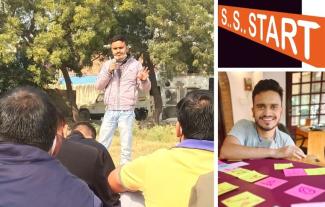A humble ssstart to my life

Puneet Singhal talks about growing up with a stammer in a poor part of New Delhi, and how it and his mentor inspired him to start an initiative aimed at empowering people with speech differences.
My life journey has been a rollercoaster so far. I was born in New Delhi, in one of Asia's largest unauthorised slum colonies called Sangam Vihar. It is home to a vast number of the working class and I suffered there due to poverty. Even drinking water and access to toilets was a luxury. According to the Times of India, 90% of the criminals of southern Delhi come from this neighbourhood, and youngsters are indulged in all sorts of illegal activities. For the youth, there are hardly any obvious opportunities and there's been a steep increase in the number of suicides among youngsters due to lack of employment.
As a child I witnessed violence amongst adults for the first time. I felt wounded and so numb that I used to stand in one place for hours without having a single thought. I found myself in shackles. Before, I was scared to sit in the dark, but at this point I found refuge in darkness. I stopped communicating.
My classmates and their parents even complained to the principal that I could be a bad influence and make all of them stammerers.
The school stage that used to be my comfort zone changed into a battlefield. When I was asked a question, my words wouldn't come out. One day, the whole class started to stammer "Gu-gu-gu-good morning", and I realised that they were mocking me. My classmates and their parents even complained to the principal that I could be a bad influence and make all of them stammerers. My mother couldn't believe that her son, whose tongue was as fast as a train and sharp as a razor, was struggling with his speech. Being subjected to constant mocking, I completely lost my confidence.
- See what Events we've got coming up
I used different strategies to ease my stammering: finding alternatives for words I generally got stuck on; reducing my statements to a minimum; or arriving late to avoid introducing myself. When people tried to help by asking me to slow down or by finishing my sentences, it made me even more self-conscious. And then there were these weird and rather dangerous pieces of advice, like licking ashes of cremated bodies or rubbing alum on the tongue until the upper layer was removed.
Looking back, my childhood was not easy, but do I regret having a stammer? No. It made me a more sensitive human being. I feel connected with all who are unable to express their thoughts and long to be understood.
Spark of inspiration
Spending time and discussing different topics with other social changemakers from diverse cultures, countries and backgrounds is making me think deeper and giving me a whole new perspective. One day I was talking to my mentor Sabriye Tenberken, a blind inspirational lady who is the founder of Kanthari, a leadership program in India for visionaries keen to drive ethical social change. I was telling her about my experience of attending the annual conference of The Indian Stammering Association and how those two days helped me to accept my stammering and realise that it has made me a more patient, empathetic and aware human being. Suddenly, Sabriye stopped me and said, "Why don't you work for people with speech disorders?". This question made so much sense to me. I saw this idea as a beginning of a new phase of my life and I named it 'sstart', as this is how I say the word start.
Based in New Delhi, ssstart will be a centre that gives hope to revive the warmth in human communication through exciting and engaging workshops, activities, and events. We will provide interactive spaces for people of all ages, genders, and backgrounds to be free, vulnerable, and patient human beings. Our main goal at ssstart is to create authentic communicators who convey their message thoroughly and balance speaking and listening effectively.
Our main goal at ssstart is to create authentic communicators who convey their message thoroughly and balance speaking and listening effectively.
We believe that any limitation can also be viewed as an advantage, and we call this the 'unfair advantage'. In ssstart, we strive to empower people with different speech disorders like stammering, lisping, sigmatism (repetitive use of the 's' sound in every word), and aphasia (difficulty putting words and speech together) by focusing on direct and truthful communication while embracing speech disabilities.
Next to this, we advocate a society that communicates openly, thinks critically, and values patience and people so that when we, those with speech disorders, try to convey our messages, those without speech disorders listen until we finish even if it takes some time. This also implies that the listeners don't finish our sentences if we get stuck.
We will demonstrate humour through activities like stand-up comedy, rapping and street plays. We will prove that we deserve to be heard and belong in society. Occasionally, we will invite successful personalities with speech disabilities to boost the self-confidence of our participants and show them that they can also achieve their dreams through constant practice and determination. We offer workshops focused on body language, public speaking and sign language. We also get help from experienced psychologists for people suffering from traumas that require clinical support.
We are on a mission to question the conventions that mechanise our existence. We are developing methodologies for new ways of communication that are simple yet effective, slow yet long-lasting, and professional yet playful. Let's ssstart!
You can find out about Puneet's initiative at the ssstart website. Please note that as ssstart is not based in the UK, it hasn't been added to our One-to-one Adult Speech & Language Therapy and Adult Stammering Courses pages, where everything listed has been reviewed by the STAMMA Service Panel.
Would you like to write an article about your experiences and opinions of anything stammering-related? See Submit Something For The Site or email editor@stamma.org for more details.
If you've enjoyed reading Puneet's article and have found his experience helpful, please consider making a donation. Donating to STAMMA means that we can carry on sharing Your Voice stories from members of our community which inspire and encourage others on their stammering journeys. Read more inspiring stories.

































